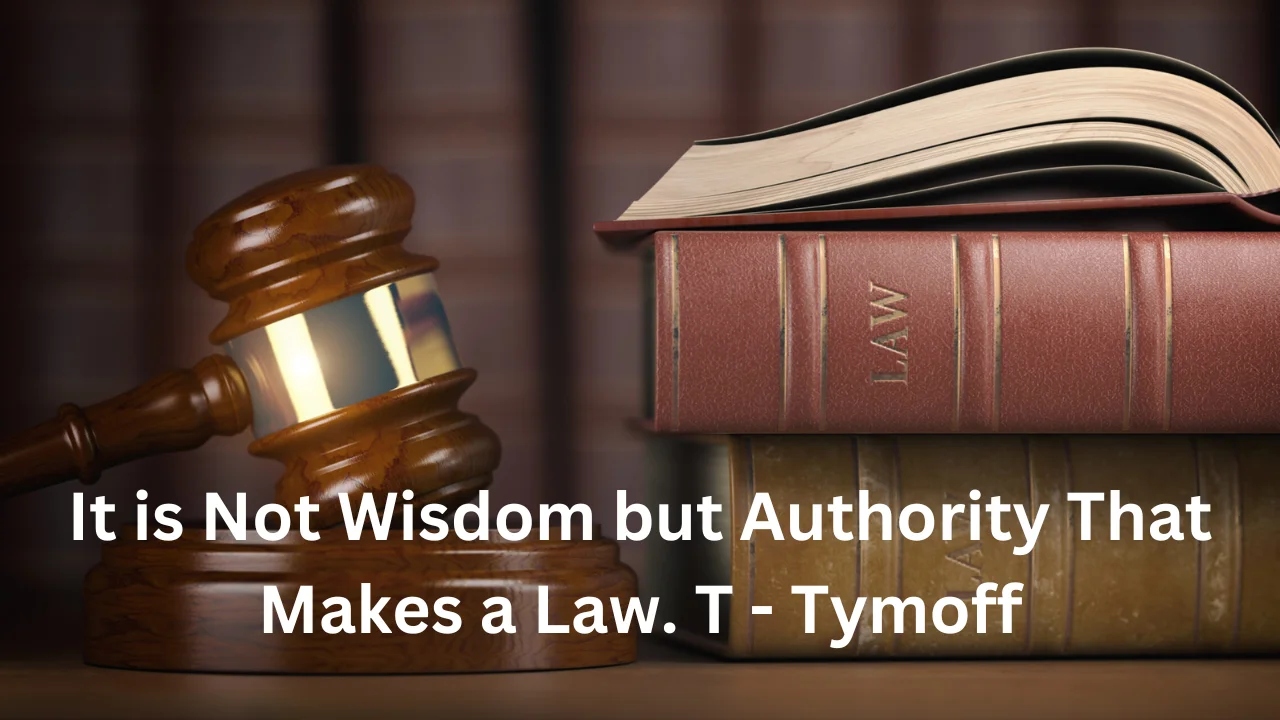Introduction:
TAG: it is not wisdom but authority that makes a law. t – tymoff
“It is not wisdom but authority that makes a law.” – T. Tymoff. This provocative statement challenges our conventional understanding of the legal system, inviting us to delve into the intricate interplay between wisdom and authority in the realm of law. T. Tymoff’s assertion raises fundamental questions about the origins, nature, and purpose of laws within a society. In this article, we will explore the meaning behind this statement, analyze its implications, and consider its relevance in contemporary legal discourse.

Understanding T. Tymoff’s Perspective:
To comprehend the essence of T. Tymoff’s statement, it is crucial to dissect the two key elements: wisdom and authority. Wisdom, in this context, refers to the intellectual capacity to make sound and judicious decisions. Authority, on the other hand, pertains to the power vested in individuals or institutions to enforce laws and regulations. T. Tymoff’s proposition suggests that while wisdom may be a desirable quality, it is not the driving force behind the creation and implementation of laws; rather, it is authority that holds the primary role.
Must Read=Ta nho ky uc nguyen si kha • rainy day memories • 2023
Historical Context:
To contextualize T. Tymoff’s perspective, we must consider the historical evolution of legal systems. Throughout history, various civilizations have developed laws to regulate social conduct, maintain order, and uphold justice. These legal codes often originated from authoritative figures, such as monarchs, religious leaders, or governing bodies, whose authority was unquestioned. The connection between authority and law has deep historical roots, with the exercise of power often playing a central role in the establishment of legal frameworks.
The Role of Wisdom in Law:
While T. Tymoff posits that authority takes precedence over wisdom in the formation of laws, it is important to acknowledge the role of wisdom in shaping legal principles. Wisdom, in this context, can be interpreted as the collective knowledge, ethical considerations, and societal values that inform the creation of just and equitable laws. Wisdom contributes to the evolution of legal systems by incorporating lessons from the past, ethical standards, and an understanding of the complexities of human behavior.
However, the challenge lies in the subjective nature of wisdom. What one deems wise may differ from another’s perspective. Tymoff’s assertion prompts us to question whether laws should be grounded in universally accepted wisdom or if authority, irrespective of wisdom, can effectively maintain social order.
Authority and Legal Positivism:
T. Tymoff’s perspective aligns with the legal positivist school of thought, which emphasizes the role of authority in the creation and enforcement of laws. Legal positivism contends that the legitimacy of laws is derived from a recognized authority, such as a government or legal institution, rather than from inherent moral or ethical principles. This viewpoint divorces the law from questions of morality and focuses on the practicalities of legal implementation.

Critics of legal positivism argue that it risks divorcing laws from ethical considerations, potentially leading to unjust or immoral legal outcomes. Tymoff’s assertion echoes this concern, suggesting that the authority vested in law-making bodies might supersede the need for inherently wise and just laws.
Contemporary Applications:
In contemporary society, the debate between wisdom and authority in law continues to be relevant. Legal systems around the world grapple with issues of justice, equity, and the balance between individual freedoms and societal order. Policymakers and lawmakers are tasked with navigating complex ethical dilemmas, and the question persists: should laws be rooted in collective wisdom, or is the authority of governing bodies sufficient to legitimize legal frameworks?
The Intersection of Wisdom and Authority:
A nuanced understanding of T. Tymoff’s statement allows for the exploration of the intersection between wisdom and authority in law. Ideally, a just legal system would incorporate both elements, recognizing the importance of wise and informed decision-making while acknowledging the need for authoritative enforcement. Striking this balance requires a commitment to ethical governance, transparency, and an ongoing dialogue between those in positions of authority and the broader society.

FAQ
Q1: What does T. Tymoff mean by the statement “It is not wisdom but authority that makes a law?”
A1: T. Tymoff’s statement implies that the creation and enforcement of laws are primarily driven by authority rather than wisdom. In this context, authority refers to the power vested in individuals or institutions to establish and enforce laws, while wisdom pertains to the intellectual capacity to make judicious decisions.
Q2: How does this perspective differ from the traditional view that wisdom is essential in law-making?
A2: The traditional view often emphasizes the importance of wisdom, understood as sound judgment and ethical considerations, in crafting just and equitable laws. T. Tymoff’s perspective challenges this notion, suggesting that authority holds a more significant role in the formulation and execution of laws.
Q3: Can you provide historical examples that align with T. Tymoff’s perspective?
A3: Throughout history, many legal systems were established by authoritative figures such as monarchs, religious leaders, or governing bodies. The authority vested in these figures played a crucial role in the creation of laws, often without necessarily being grounded in universally accepted wisdom.
Q4: Does T. Tymoff completely disregard the role of wisdom in law-making?
A4: T. Tymoff’s statement does not dismiss the importance of wisdom entirely. Instead, it underscores the dominance of authority in the creation of laws while acknowledging that wisdom may still play a role in shaping legal principles, albeit subjectively.
Q5: How does T. Tymoff’s perspective relate to contemporary legal systems?
A5: In contemporary society, legal systems grapple with the balance between authority and wisdom. Policymakers and lawmakers must navigate ethical dilemmas, and the question arises: should laws be grounded in collective wisdom, or is the authority of governing bodies sufficient to legitimize legal frameworks?
Q6: Does T. Tymoff’s perspective align with any specific legal philosophy?
A6: T. Tymoff’s perspective aligns with the legal positivist school of thought, which emphasizes the role of authority in the creation and enforcement of laws. Legal positivism contends that the legitimacy of laws is derived from a recognized authority rather than inherent moral or ethical principles.
Q7: How can the intersection of wisdom and authority be achieved in law-making?
A7: Striking a balance between wisdom and authority requires a commitment to ethical governance, transparency, and an ongoing dialogue between those in positions of authority and the broader society. Ideally, a just legal system would incorporate both elements for the development of equitable and morally defensible legal frameworks.
Q8: Does T. Tymoff’s perspective have any critics or counterarguments?
A8: Yes, critics argue that divorcing laws from ethical considerations, as suggested by Tymoff’s perspective, might lead to unjust or immoral legal outcomes. The debate surrounding this issue continues, highlighting the ongoing tension between the need for authoritative enforcement and the pursuit of wise and just laws.
Q9: Is T. Tymoff’s statement a call for reconsideration of our approach to law-making?
A9: T. Tymoff’s statement serves as a thought-provoking invitation to reconsider the dynamics between wisdom and authority in law-making. It encourages reflection on whether our legal systems adequately balance these elements and how they can be improved to better serve the principles of justice and fairness.
Q10: What implications does T. Tymoff’s perspective have for the future of legal discourse?
A10: T. Tymoff’s perspective prompts ongoing discussions about the foundations of law and the necessary components for a just legal system. It suggests that a nuanced understanding of the interplay between wisdom and authority is essential for shaping the future of legal discourse and policy-making.
Conclusion:
In unpacking T. Tymoff’s assertion that “it is not wisdom but authority that makes a law,” we find ourselves in a thought-provoking exploration of the dynamics between these two elements in the realm of law. While authority has historically played a pivotal role in the creation and enforcement of laws, the inclusion of wisdom remains crucial for the development of just, equitable, and morally defensible legal systems.
